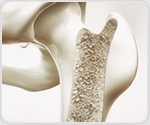
|
|
|
| |

|
|
| |
The latest women's health news from News Medical |
|
|
|
|  | | | | |  Experts say you don’t need 10,000 steps, here’s the new magic number Experts say you don’t need 10,000 steps, here’s the new magic number A major systematic review finds that walking just 7,000 steps per day, rather than the traditional 10,000, can significantly reduce the risk of mortality, cardiovascular disease, dementia, and more. The analysis, published in The Lancet Public Health, provides an evidence-based and achievable target for adult health. | |  | | | | |  Heavy smoking linked to atrophy in Alzheimer’s brain regions Heavy smoking linked to atrophy in Alzheimer’s brain regions MRI findings indicate that smoking is linked to reduced brain volume, raising concerns about dementia risk, especially with higher body mass index. | |  | | | | |  How much does online negativity really affect your mind? How much does online negativity really affect your mind? Negative comments on social media can significantly increase anxiety and lower mood in adults, according to a new experimental study. Younger adults are particularly susceptible to the psychological effects of online negativity. | |
|
|
|  | | |  Almost 200 million people, including children, around the world have endometriosis, a chronic disease in which the lining of the uterus grows outside of the uterus. Almost 200 million people, including children, around the world have endometriosis, a chronic disease in which the lining of the uterus grows outside of the uterus. | | | | |  YCT-529, a novel non-hormonal male contraceptive, demonstrates safety and tolerability in early trials, offering a potential solution for male birth control. YCT-529, a novel non-hormonal male contraceptive, demonstrates safety and tolerability in early trials, offering a potential solution for male birth control. | | | | |  New research reveals that tiny amounts of PFAS-widely known as "forever chemicals"-cross the placenta and breast milk to alter infants' developing immune systems, potentially leaving lasting imprints on their ability to fight disease. New research reveals that tiny amounts of PFAS-widely known as "forever chemicals"-cross the placenta and breast milk to alter infants' developing immune systems, potentially leaving lasting imprints on their ability to fight disease. | | | | |  Long-term gluten reduction may disrupt gut microbiota balance, reducing beneficial bacteria and increasing ethanol, linked to inflammation and metabolic risks. Long-term gluten reduction may disrupt gut microbiota balance, reducing beneficial bacteria and increasing ethanol, linked to inflammation and metabolic risks. | | | | |  The CoVerage system monitors SARS-CoV-2 evolution, predicting variants and scoring amino acid changes to inform vaccine efficacy and public health strategies. The CoVerage system monitors SARS-CoV-2 evolution, predicting variants and scoring amino acid changes to inform vaccine efficacy and public health strategies. | | | | |  Liupao tea shows promise in improving metabolic syndrome markers, enhancing heart health and gut balance in just three months, according to recent research. Liupao tea shows promise in improving metabolic syndrome markers, enhancing heart health and gut balance in just three months, according to recent research. | | | | |  This study reveals how machine learning models uncover new genetic variants linked to Alzheimer’s, advancing predictive accuracy in genetic epidemiology. This study reveals how machine learning models uncover new genetic variants linked to Alzheimer’s, advancing predictive accuracy in genetic epidemiology. | | | | |  Moderate coffee intake and both moderate and high tea consumption are associated with a slower decline in fluid intelligence among older adults over nearly a decade. High coffee intake, however, is linked to a faster decline in cognitive function. Moderate coffee intake and both moderate and high tea consumption are associated with a slower decline in fluid intelligence among older adults over nearly a decade. High coffee intake, however, is linked to a faster decline in cognitive function. | | | | |  Investigating vegetable oils, this study reveals their effects on skin cell proliferation and migration, emphasizing the role of fatty acid composition. Investigating vegetable oils, this study reveals their effects on skin cell proliferation and migration, emphasizing the role of fatty acid composition. | | | | | A new study from researchers at the Indiana University Paul H. O'Neill School of Public and Environmental Affairs and the University of Notre Dame shows that per- and polyfluoroalkyl chemicals (PFAS)-also known as "forever chemicals"-can be found in reusable feminine hygiene products. | | | | |  This study reveals how probiotic bacteria directly influence brain cell function, highlighting gut-brain communication and potential therapeutic applications. This study reveals how probiotic bacteria directly influence brain cell function, highlighting gut-brain communication and potential therapeutic applications. | | | | |  Gut fungal communities may impact multiple sclerosis severity, offering new insights into MS pathogenesis and potential microbiome-based treatment strategies. Gut fungal communities may impact multiple sclerosis severity, offering new insights into MS pathogenesis and potential microbiome-based treatment strategies. | | | | |  A new study has found that the bone fracture protection women get from menopausal hormone therapy (MHT, also known as HRT) disappears within a year of stopping treatment. A new study has found that the bone fracture protection women get from menopausal hormone therapy (MHT, also known as HRT) disappears within a year of stopping treatment. | | | | |  LaShae Rolle, 27, is a competitive powerlifer who could squat 441 pounds, bench 292 pounds and deadlift 497 pounds. She is also a breast cancer survivor and researcher and the lead author on a first-of-its kind study documenting elite-level strength training during active breast cancer treatment. LaShae Rolle, 27, is a competitive powerlifer who could squat 441 pounds, bench 292 pounds and deadlift 497 pounds. She is also a breast cancer survivor and researcher and the lead author on a first-of-its kind study documenting elite-level strength training during active breast cancer treatment. | | | | |  A crossover trial in healthy young adults found that both lean chicken and beef diets reduced gut microbial richness, but only chicken caused significant diversity loss. The study highlights that lean local beef may have a milder impact on the gut microbiome than chicken. A crossover trial in healthy young adults found that both lean chicken and beef diets reduced gut microbial richness, but only chicken caused significant diversity loss. The study highlights that lean local beef may have a milder impact on the gut microbiome than chicken. | |
|
|
|
|
|
|
|